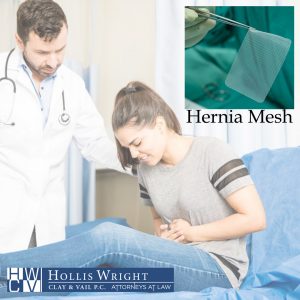Hernia mesh implants have been used by surgeons to repair hernias for years. These mesh implants are made of either synthetic materials or biologic tissue (made from pigs or cows). But why would you need a hernia repair surgery in the first place? A hernia occurs when tissue protrudes through a weakened spot in the surrounding tissue or muscle. This can be very painful and ultimately lead to a hernia repair surgery. There are many causes of hernias, including: physical exertion (lifting heavy objects), muscle weakness, or obesity. The most common types of hernias are inguinal (inner groin), femoral (outer groin), umbilical (belly button), incisional (caused by an incision), and hiatal (upper stomach).
One of the primary treatments for a hernia is surgery using hernia mesh. A hernia repair surgery can be done laproscopically (when several small incisions are made to allow surgical tools into the opening), or open (when a large incision is made). The mesh used can either be synthetic or made with biologic tissue and is intended to provide extra support on the of the weakened tissue.
The most common and widely publicized lawsuits involve synthetic hernia mesh manufactured by Atrium, Bard/Davol, Covidien, and Ethicon. Lawsuits have been filed around the country and include claims that these hernia mesh devices are defective in many ways—migrating, not incorporating well into the body, or balling up. Many claimants allege that they suffer from serious injuries due to defective hernia mesh products including:
- Pain,
- Infection,
- Hernia recurrence,
- Adhesions,
- Blockage of the large or small intestine (obstruction),
- Bleeding,
- Perforation of the large or small intestine,
- Abnormal connection between organs, vessels, or intestines (fistula).
 These injuries and many others have led to patients needing an additional surgery to repair and/or remove the defective mesh (commonly called a revision surgery). However, at times, the surgery is too dangerous due to the patient’s medical condition or for other reasons. In these instances, the patient tragically has to live with the pain and suffering from the defective mesh and rely upon prescription medications and other therapeutics for relief.
These injuries and many others have led to patients needing an additional surgery to repair and/or remove the defective mesh (commonly called a revision surgery). However, at times, the surgery is too dangerous due to the patient’s medical condition or for other reasons. In these instances, the patient tragically has to live with the pain and suffering from the defective mesh and rely upon prescription medications and other therapeutics for relief.
If you have undergone a hernia repair surgery, in which mesh was used, and had an additional surgery (or have been told that you need one), it is of the utmost importance that you identify what type of mesh was used during your surgery. You can either contact the medical facility where your surgery took place or contact an attorney for help. If you think that you may have a hernia mesh claim, contact the Birmingham hernia mesh attorneys at Hollis, Wright & Clay, P.C. sooner rather than later. Various deadlines and statutes of limitation apply to these claims. Missing a deadline could permanently bar you from filing a claim.
Hollis, Wright & Clay, P.C. continues to accept hernia mesh clients who have undergone or are scheduled to undergo an additional surgery to repair and/or remove the hernia mesh. Take advantage of our free consultation and allow us to evaluate your potential case. Call us at 844.LAW.TALK or 205.324.3600, or contact us online on the form on this page or here. You can find more detailed information regarding hernia mesh claims on our website here.
 Alabama Injury Law Blog
Alabama Injury Law Blog

